|
Bike Rental
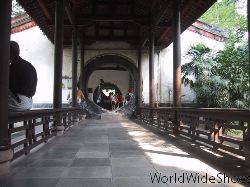 Not only does a bed at my hostel here cost only 3USD, but the Mix Hostel
rents bicycles for 1.25USD a day. After recovering from my 6am arrival on
the train from Xian, I took a bike out for a spin. I made a point of
picking the worst bike out of a very sad lot parked out front. The brakes
handles are directly connected to the breakpads by metal rods instead of
cables, and the tires are beyond what I would call "flat" but once you get
this up to speed, it is fun to tool around the city. Chengdu is even
bigger than Xian, so it takes more than a half hour to cross the city
center. Luckily, most of the major roads that go through downtown have
separate bike lanes. Like Michael noted around Shanghai, the bike lanes
are often full of electric bikes, which look like scooters but make no
noise, taxis, pushcarts, etc. The col thing is that many of the bike
lanes in this city are tree-lined, so it is almost bearable to ride a
jallopy around in the 90F heat
Not only does a bed at my hostel here cost only 3USD, but the Mix Hostel
rents bicycles for 1.25USD a day. After recovering from my 6am arrival on
the train from Xian, I took a bike out for a spin. I made a point of
picking the worst bike out of a very sad lot parked out front. The brakes
handles are directly connected to the breakpads by metal rods instead of
cables, and the tires are beyond what I would call "flat" but once you get
this up to speed, it is fun to tool around the city. Chengdu is even
bigger than Xian, so it takes more than a half hour to cross the city
center. Luckily, most of the major roads that go through downtown have
separate bike lanes. Like Michael noted around Shanghai, the bike lanes
are often full of electric bikes, which look like scooters but make no
noise, taxis, pushcarts, etc. The col thing is that many of the bike
lanes in this city are tree-lined, so it is almost bearable to ride a
jallopy around in the 90F heat
Dufu's Cottage
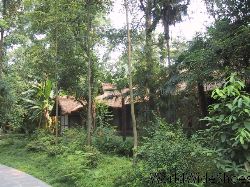 After another fruitless search for any English newspaper or magazine, I
rode west along the river to see this garden and cottage. Dufu is a
famous Chinese poet who lived here in Chengdu around 795AD. The original
cottage is gone, of course, but people have done a nice job of keeping-up
and expanding the gardens over the years. I spent most of the afternoon
here trying to escape the heat. The local senior citizens can get in for
free, so it was fun to watch many of them practice tai-chi, play mahjong
(like dominoes?), cards, etc. I spent a few hours trying to figure out
why the Chinese currency has always traded at 8yuan to the dollar (see
Extra Credit).
After another fruitless search for any English newspaper or magazine, I
rode west along the river to see this garden and cottage. Dufu is a
famous Chinese poet who lived here in Chengdu around 795AD. The original
cottage is gone, of course, but people have done a nice job of keeping-up
and expanding the gardens over the years. I spent most of the afternoon
here trying to escape the heat. The local senior citizens can get in for
free, so it was fun to watch many of them practice tai-chi, play mahjong
(like dominoes?), cards, etc. I spent a few hours trying to figure out
why the Chinese currency has always traded at 8yuan to the dollar (see
Extra Credit).
Panda Breeding
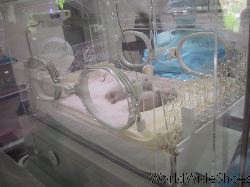 The number one tourist attraction in town is a facility where China's
panda bear research is carried out. The second morning here, I took a bus
out to there early in the morning to see some of the bears as they were
being fed. I got to see a couple adult bears, some "pre-adults" some
kids, and two babies that were no bigger than my hand. There are less
than 1000 of these bears left in the world, and they only live into their
20s, so the population is definitely at risk. They have successully bread
about 40 bears at this facility either naturally or through artificial
insemination. However, it seems like most of these end-up in zoos and
whatnot, so it was not clear what the prospects are for the wild
population. Anyway, it was fun seeing the young bears horsing around and
tumbling off their swings and whatnot. The adults were a bit lazier, but
they were all fun to look at. I got some good pictures to share.
The number one tourist attraction in town is a facility where China's
panda bear research is carried out. The second morning here, I took a bus
out to there early in the morning to see some of the bears as they were
being fed. I got to see a couple adult bears, some "pre-adults" some
kids, and two babies that were no bigger than my hand. There are less
than 1000 of these bears left in the world, and they only live into their
20s, so the population is definitely at risk. They have successully bread
about 40 bears at this facility either naturally or through artificial
insemination. However, it seems like most of these end-up in zoos and
whatnot, so it was not clear what the prospects are for the wild
population. Anyway, it was fun seeing the young bears horsing around and
tumbling off their swings and whatnot. The adults were a bit lazier, but
they were all fun to look at. I got some good pictures to share.
Sichuan Food
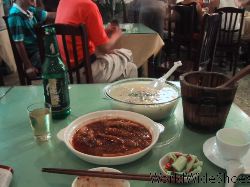 Chengdu is the capitol of the Sichuan province. Sichuan food is famous
for being spicey and is one of the more popular varieties of Chinese foods
overseas. Tonight, I went out for a "hot pot" with a few people I met at
the hostel. As you might have guessed, there is a huge metal pot in the
middle of the table that is heated to a boil. We opted for a mildly hot
pot with a super hot pot in the middle of it. We ordered beef, fish, eel,
and veggies to throw into the spicey stew. Armed with a couple bottles of
Snow-brand beer, it turned out to be quite a feast. Unfortunately,
something I ate in the last couple days didn't sit well with my stomach,
so I spent one full afternoon on a tea-only diet. If that is the only
problem I have during my two months of travel, I will be happy.
Chengdu is the capitol of the Sichuan province. Sichuan food is famous
for being spicey and is one of the more popular varieties of Chinese foods
overseas. Tonight, I went out for a "hot pot" with a few people I met at
the hostel. As you might have guessed, there is a huge metal pot in the
middle of the table that is heated to a boil. We opted for a mildly hot
pot with a super hot pot in the middle of it. We ordered beef, fish, eel,
and veggies to throw into the spicey stew. Armed with a couple bottles of
Snow-brand beer, it turned out to be quite a feast. Unfortunately,
something I ate in the last couple days didn't sit well with my stomach,
so I spent one full afternoon on a tea-only diet. If that is the only
problem I have during my two months of travel, I will be happy.
--By the Way--
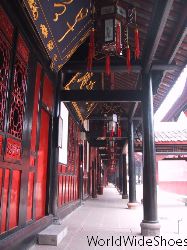
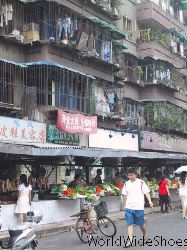 For the longest time, China had a policy of pegging the yuan at exactly
8yuan for every dollar. However, due to pressure from the US and
elsewhere, the government agreed to let the currency "float" slightly, so
that its value would actually be determined by market forces: supply and
demand. The funny thing is that about one year later, the currency still
trades at about 8to1. How is this possible? The demand for yuan has to
be high and growing considering all of the people (countries, businesses,
etc) that want to buy Chinese products, invest in Chinese equities, and
partner with Chinese businesses. To counteract this demand, the Chinese
government can either a)increase the supply of yuan (by printing more),
b)increase the relative demand for USD (by buying more), or c)both. Since
the Chinese central bank now has more foreign-currency reserves than any
other country, it is clear that they are propping-up the dollar to make it
look stronger than it really should be (by creating false demand). This
keeps Chinese products cheap for people holding the "strong" dollars
(Americans) and discourages Chinese from importing from the US. Since the
Chinese goods seem cheap, this should fuel more demand for yuan because
more people want those cheap goods and services. BUT, the government
continues to keep the exchange rate stable. My question: why can't they
do this forever? Why don't we do it? My conclusion: maybe I am not
cut-out for economics.
For the longest time, China had a policy of pegging the yuan at exactly
8yuan for every dollar. However, due to pressure from the US and
elsewhere, the government agreed to let the currency "float" slightly, so
that its value would actually be determined by market forces: supply and
demand. The funny thing is that about one year later, the currency still
trades at about 8to1. How is this possible? The demand for yuan has to
be high and growing considering all of the people (countries, businesses,
etc) that want to buy Chinese products, invest in Chinese equities, and
partner with Chinese businesses. To counteract this demand, the Chinese
government can either a)increase the supply of yuan (by printing more),
b)increase the relative demand for USD (by buying more), or c)both. Since
the Chinese central bank now has more foreign-currency reserves than any
other country, it is clear that they are propping-up the dollar to make it
look stronger than it really should be (by creating false demand). This
keeps Chinese products cheap for people holding the "strong" dollars
(Americans) and discourages Chinese from importing from the US. Since the
Chinese goods seem cheap, this should fuel more demand for yuan because
more people want those cheap goods and services. BUT, the government
continues to keep the exchange rate stable. My question: why can't they
do this forever? Why don't we do it? My conclusion: maybe I am not
cut-out for economics.
Aaron Bishop
20 August 2006
|